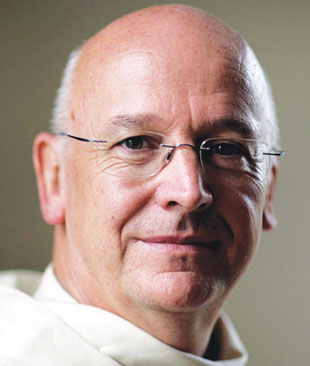Communicating the Calm of Stillness
"Some years ago, I was in Thailand visiting a Buddhist monastery. To get there, I had to rush for a train and fight for a seat. As I sat in it, hot and bothered, I suddenly noticed (after ten minutes or so) that there was a Buddhist monk sitting in front of me. I noticed him because he had not moved a muscle since I got on. My first thought was that he was dead; but, no, he was alive and probably more alive than the rest of us. Gradually, I felt his stillness communicate itself and influence the people in the crowded carriage around him. People did not look at him, speak to him, or discuss him. But his mindfulness was very much part of our group and a powerful influence on how we related to each other. The actively contemplative parts of our world, or our days, cannot always be justified in material terms; but without them, the quality of our lives are fatally impaired."
— Common Ground: Letters to a World Community of Meditators
Everything Happens at The Right Time
"One of the early Fathers said that 'there is no such thing as delay with the Holy Spirit.' This means that everything happens at the right moment."
— Common Ground: Letters to a World Community of Meditators
Questions in the Gospels
"Unlike answers, questions attract and hold our attention. They are irresistible, like a half-open door. Answers, especially wrapped in dogmatic certainty or claiming to be right in this form for all time, soon come either to bore or oppress us. Even the best answers can be as unwelcoming as a door banged in our face when they exclude alternative responses. Rather than giving answers and making rules Jesus called people to experiential knowledge. By asking questions or telling stories he invited his hearers to a personal discovery of truth, a redemptive recognition of reality. Throughout the gospels it is his questions which magnetize and capture our attention. Often they also deftly turn the attacks of his hostile critics back on themselves. It is by questions that he leads his disciples into a deeper understanding of who we are and who he is. These are the inseparable twin insights of his gift to humanity."
— Jesus: the Teacher Within
Jesus As Guru
"A Christian is essentially a disciple of Jesus. And he is their guru. Good disciples do not feel that their guru is in competition with other gurus.
"Tolerance, dialogue and collaboration are the challenges facing Christian disciples today. For the first time since the fourth century institutional Christianity is not bolstered up by a secular power that supports religious exclusivism. Christians are being invited to see themselves as disciples of Jesus in a new relationship to the disciples of masters in other traditions. Realizing that Jesus is their personal guru is decisive for freeing Christians from engrained attitudes of imperialism and historical intolerance. They are then freed for dialogue and spiritual partnership with other faiths. The question by which Jesus relates to his disciples therefore also connects him to the spiritual search that is common to humanity."
— Jesus: the Teacher Within
Silence and Attention
"We are silent whenever we pay attention. We pay attention when there is no 'I' thought, no self-reflective consciousness, no thought that we are the observer. This attention is the essence of prayer. Whenever we are in this state we are in prayer whether we are in church or supermarket, bedroom or boardroom, making love or making money. The dimension of our being that is addressed by the question of Jesus is perpetually in this state. When we pray, we return to prayer. When we listen, we return to silence."
— Jesus: the Teacher Within
Meditation
"If philosophy, as Plato said, begins in wonder, meditation, for John Main, begins with an overwhelming sense of reverence. This remains the best preparation for meditation. The loss of a sense of the sacred, including the sacredness of our own humanity, poses a great danger to the world. And therefore growth in spiritual awareness is today's highest priority. For this to be accomplished, we must recover the experience and meaning of silence.
"Silence has psychological aspects, of course, but John Main is interested in the spiritual discovery awaiting us if we enter the silence that is within us. What we experience in that eternal silence is the love of God. And once experienced we know that love is the 'supreme reality.' "
— John Main: Essential Writings
